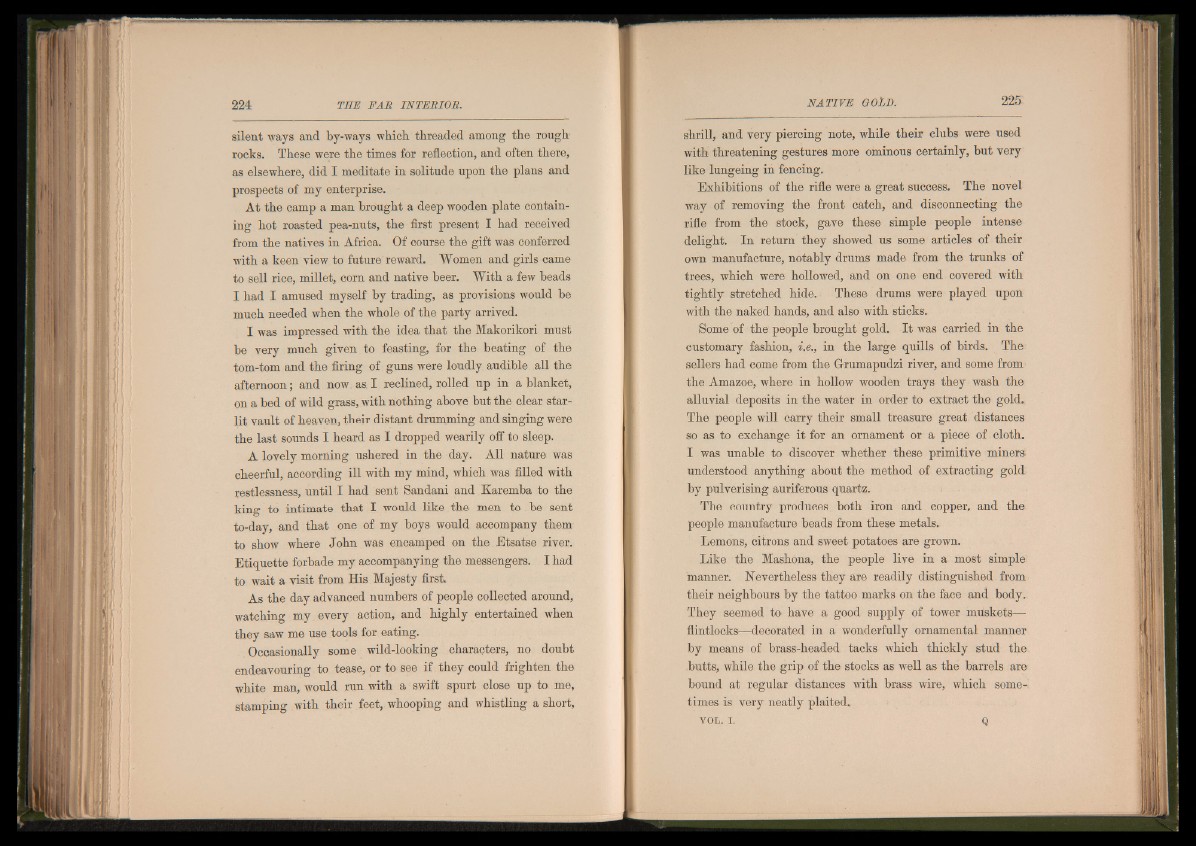
silent ways and by-ways which threaded among the rough
rocks. These were the times for reflection, and often there,
as elsewhere, did I meditate in solitude upon the plans and
prospects of my enterprise.
At the camp a man brought a deep wooden plate containing
hot roasted pea-nuts, the first present I had received
from the natives in Africa. Of course the gift was conferred
with a keen view to future reward. Women and girls came
to sell rice, millet, corn and native beer. With a few beads
I had I amused myself by trading, as provisions would be
much needed when the whole of the party arrived.
I was impressed with the idea that the Makorikori must
be very much given to feasting, for the beating of the
tom-tom and the firing of guns were loudly audible all the
afternoon; and now as I reclined, rolled up in a blanket,
on a bed of wild grass, with nothing above but the clear starlit
vault of heaven, their distant drumming and singing were
the last sounds I heard as I dropped wearily off to sleep.
A lovely morning ushered in the day. All nature was
cheerful, according ill with my mind, which was filled with
restlessness, until I had sent Sandani and Karemba to the
king to intimate that I would like the men to be sent
to-day, and that one of my boys would accompany them
to show where John was encamped on the Etsatse river.
Etiquette forbade my accompanying the messengers. I had
to wait a visit from His Majesty first.
As the day advanced numbers of people collected around,
watching my every action, and highly entertained when
they saw me use tools for eating.
Occasionally some wild-looking characters, no doubt
endeavouring to tease, or to see if they could frighten the
white man, would run with a swift spurt close up to me,
stamping with their feet, whooping and whistling a short,
shrill, and very piercing note, while their clubs were used
with threatening gestures more ominous certainly, but very
like lungeing in fencing.
Exhibitions of the rifle were a great success. The novel
way of removing the front catch, and disconnecting the
rifle from the stock, gave these simple people intense
delight. In return they showed us some articles of their
own manufacture, notably drums made from the trunks of
trees, which were hollowed, and on one end covered with
tightly stretched hide. These drums were played upon
with the naked hands, and also with sticks.
Some of the people brought gold. I t was carried in the
customary fashion, i.e., in the large quills of birds. The
sellers had come from the Grumapudzi river, and some from
the Amazoe, where in hollow wooden trays they wash the
alluvial deposits in the water in order to extract the gold.
The people will carry their small treasure great distances
so as to exchange it for an ornament or a piece of cloth.
I was unable to discover whether these primitive miners
understood anything about the method of extracting gold
by pulverising auriferous quartz.
The country produces both iron and copper, and the
people manufacture beads from these metals.
Lemons, citrons and sweet potatoes are grown.
Like the Mashona, the people live in a most simple
manner. Nevertheless they are readily distinguished from
their neighbours by the tattoo marks on the face and body.
They seemed to have a good supply of tower mnskets—
flintlocks—decorated in a wonderfully ornamental manner
by means of brass-headed tacks which thickly stud the
butts, while the grip of the stocks as well as the barrels are
bound at regular distances with brass wire, which sometimes
is very neatly plaited.
v o n . I. Q